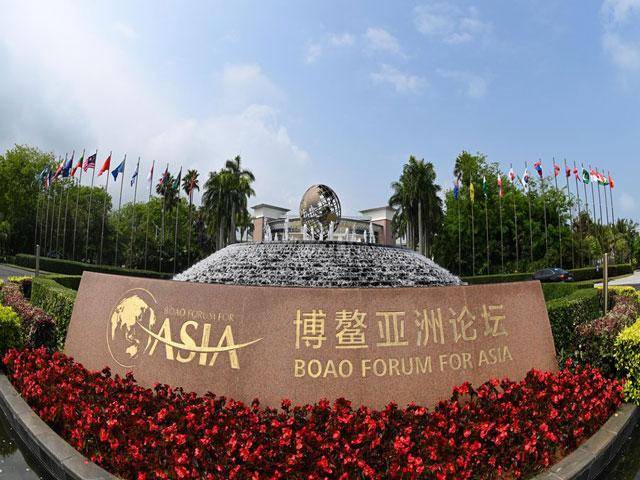HAIKOU - Eyeing China’s increasingly booming new sectors, representatives from multinational companies shed light on their new investment projects and businesses in the country at the Boao Forum for Asia Annual Conference 2022, which concluded in south China’s Hainan province on Friday.
Qian Kun, senior vice president of Qualcomm, said that the fundamentals of China’s high-quality development and long-term economic improvement would not change. It will provide more development opportunities for Qualcomm and its partners and make them look forward to future growth in China.
According to a report released by the forum, China took the lead in effectively containing the COVID-19 outbreak and fully resuming work and production with industrial and supply chains operating steadily; some out-going production lines have returned to China. New forms of businesses, represented by the digital economy is booming in the country. China’s digital economy currently is the second largest and boasts the fastest growth in the world. Foreign direct investment into the country hit a record high of 173.5 billion US dollars in 2021, compared with 111.7 billion dollars in 2012.
“China has become one of Qualcomm’s largest markets and innovation bases globally,” Qian said. He added that China’s digital economy achieved rapid growth, represented by 5G, artificial intelligence, the Internet of Things, and VR/AR. Qualcomm will continue to integrate with China’s industry to jointly create a new model of the digital economy.
Hannah Qiu, China CEO of PayPal, said that the online payment giant has been operating in China for more than a year. Its main business is to help Chinese enterprises better sell their products to overseas markets.
“We have benefitted from China’s opening up. We believe that China’s higher level of opening up will help us get more Chinese market share and play a more significant role in cross-border payment and communication between China’s capital market and overseas capital markets,” Qiu said.
Sanguine about the development prospect of China’s health sector, AstraZeneca has established an internet hospital project in the Hainan Free Trade Port. Now, 100,000 doctors have registered on the company’s platform to serve millions of patients. Leif Johansson, chairman of AstraZeneca, said that after the epidemic, they would continue to uphold the concept of innovation, continuously increase investment in China, and deepen cooperation with local enterprises. Chemical company SABIC has also found business opportunities from China’s green development goals.
Yousef Abdullah Al-Benyan, vice chairman and CEO of SABIC, said under the backdrop of the company’s own carbon neutrality strategy and China’s carbon peaking and neutrality goals, SABIC will continue its investment cooperation in China.
Qian Kun, senior vice president of Qualcomm, said that the fundamentals of China’s high-quality development and long-term economic improvement would not change. It will provide more development opportunities for Qualcomm and its partners and make them look forward to future growth in China.
According to a report released by the forum, China took the lead in effectively containing the COVID-19 outbreak and fully resuming work and production with industrial and supply chains operating steadily; some out-going production lines have returned to China. New forms of businesses, represented by the digital economy is booming in the country. China’s digital economy currently is the second largest and boasts the fastest growth in the world. Foreign direct investment into the country hit a record high of 173.5 billion US dollars in 2021, compared with 111.7 billion dollars in 2012.
“China has become one of Qualcomm’s largest markets and innovation bases globally,” Qian said. He added that China’s digital economy achieved rapid growth, represented by 5G, artificial intelligence, the Internet of Things, and VR/AR. Qualcomm will continue to integrate with China’s industry to jointly create a new model of the digital economy.
Hannah Qiu, China CEO of PayPal, said that the online payment giant has been operating in China for more than a year. Its main business is to help Chinese enterprises better sell their products to overseas markets.
“We have benefitted from China’s opening up. We believe that China’s higher level of opening up will help us get more Chinese market share and play a more significant role in cross-border payment and communication between China’s capital market and overseas capital markets,” Qiu said.
Sanguine about the development prospect of China’s health sector, AstraZeneca has established an internet hospital project in the Hainan Free Trade Port. Now, 100,000 doctors have registered on the company’s platform to serve millions of patients. Leif Johansson, chairman of AstraZeneca, said that after the epidemic, they would continue to uphold the concept of innovation, continuously increase investment in China, and deepen cooperation with local enterprises. Chemical company SABIC has also found business opportunities from China’s green development goals.
Yousef Abdullah Al-Benyan, vice chairman and CEO of SABIC, said under the backdrop of the company’s own carbon neutrality strategy and China’s carbon peaking and neutrality goals, SABIC will continue its investment cooperation in China.






